► We drive new Renault Scenic E-Tech
► Return of Scenic badge, now an SUV
► Fully electric family wagon on test
Despite the hype, the fact is the electric car market in the U.K. is still relatively small. Not insignificant and, also somewhat counter-intuitively, now getting quite crowded with all sorts of tempting contenders. Which is why the Renault Scenic E-Tech electric isn’t just a great electric SUV, but a great car. A great car, which, by the way, happens to be electric, is the general theme.
So great, says Renault, that it’s is good enough to compete not only with EV rivals such as the Kia e-Niro, Peugeot e-3008 and Tesla Model Y, but also ‘regular’ rivals with one of those suck-squeeze-bang-blow oddities up front, like the Nissan Qashqai and Skoda Karoq.
Is it an MPV? The original Scenic was when it was launched back in 1996 and, incidentally, picked up a European Car of the Year award soon after. Renault says no comment to it’s MPVness. So, is it an electric SUV, then? Well, no, apparently it’s not one of those, either. Yes, it looks like one, and quite a handsome one, too, but it’s not an SUV according to Renault.
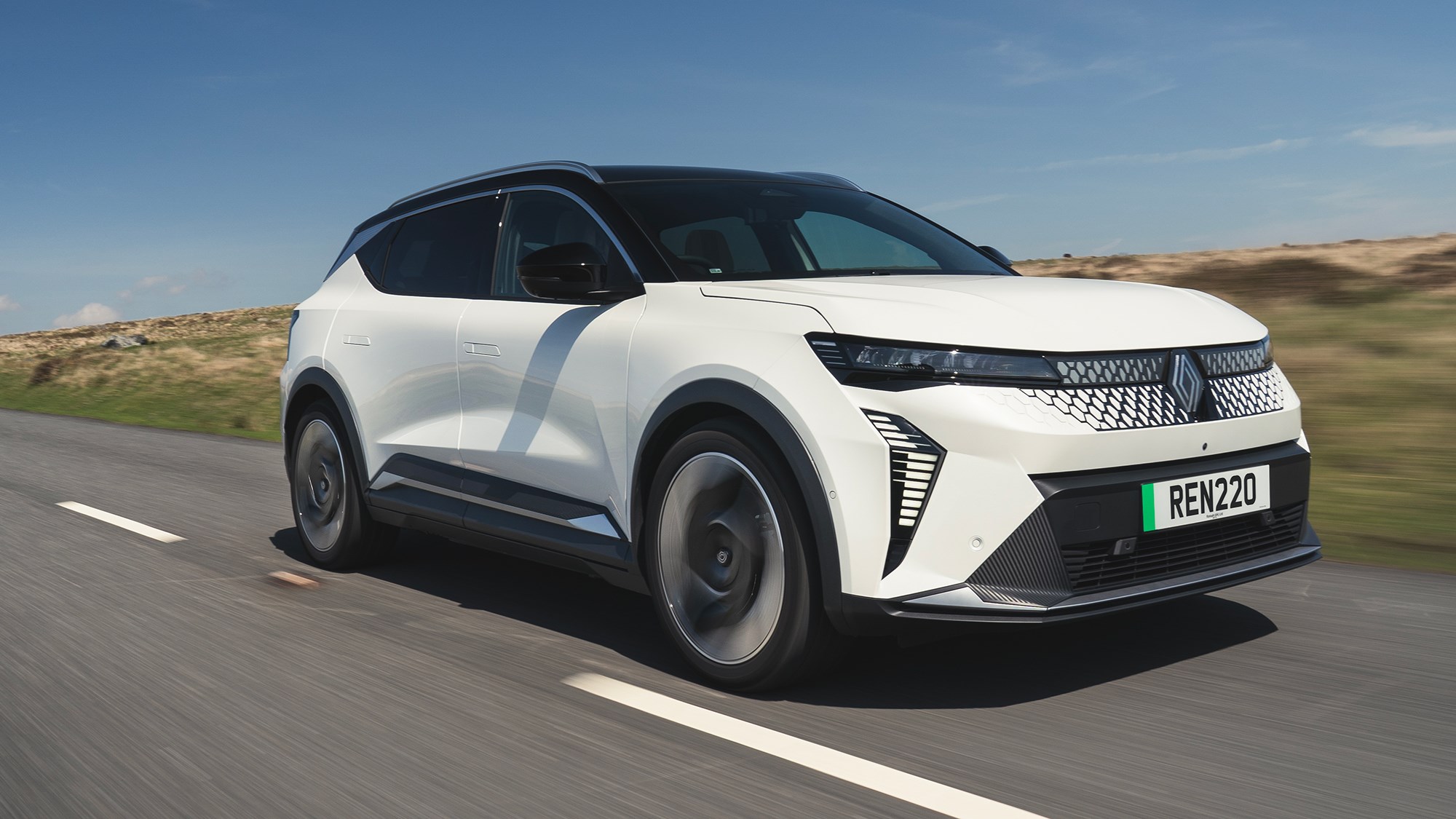
Again, the answer is it’s just a car, and a great one, apparently. “We are not putting it in a box, it’s up to the customer to decide what it is,” say its maker. Interesting.
Well, whatever it is, the omens are good. Like its predecessor, it’s another European Car of the Year winner. So the question is, are Renault and those ECOTY judges right? Is the Renault Scenic E-Tech electric a great electric car, or even a great car full stop?
Pros: Engaging handling, efficient powertrain, good range
Cons: Ride can be jiggly at times, poor rear visibility
The 2024 Scenic E-Tech: battery and range
Think of the 2024 Scenic as the Mégane E-Tech’s big brother, with more space and a longer-range battery option. It’s 4470mm long, around the same size as a Kia Niro EV and forthcoming Ford Explorer.
Two battery sizes are offered: 60kWh and 87kWh. The entry-level battery has the same capacity as the top Mégane, but Renault claims the Scenic’s new Nickel Manganese Cobalt (NMC) cell chemistry boosts energy density by 6 per cent.
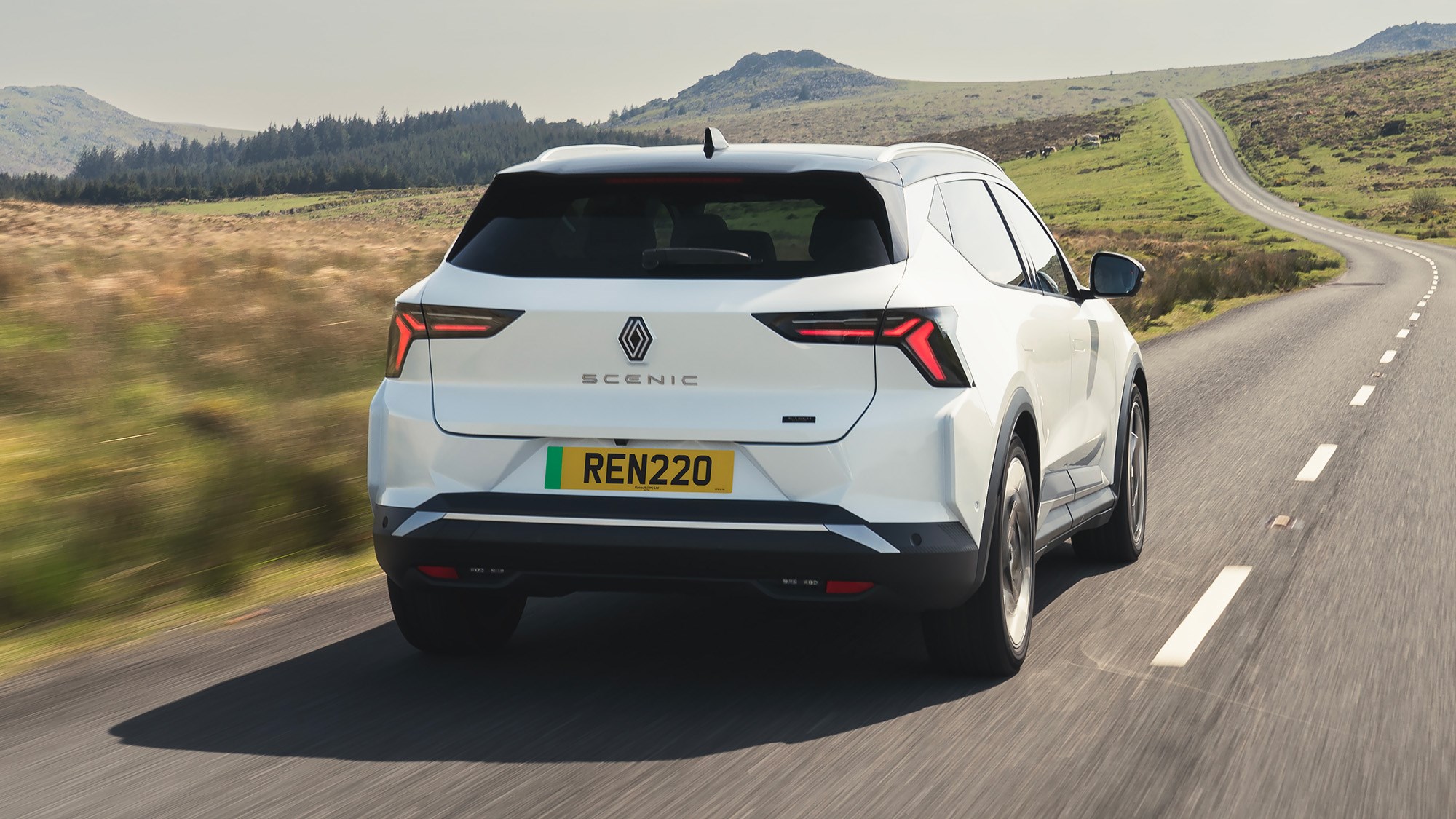
On top of that, each of the battery’s 12 modules can be individually replaced should they fail, making the battery serviceable to a degree – in around 20 centres at present. The base Scenic’s official range is 260 miles, while the 87kWh model travels 379 miles on the WLTP test cycle. For reference, the latter is impressive and beats the best Skoda Enyaq or Tesla Model Y.
One electric motor, two power outputs and efficiency figures
The Scenic is strictly front-wheel drive, and the electrically excited synchronous motor (EESM) has different peak power depending on pack size. The 60kWh battery feeds a 125kW/168bhp output, the long-range 87kWh model gets 160kW/215bhp.
The EESM’s rotor, densely wound in copper, doesn’t need a permanent magnet to create the magnetic field to spin, helping eliminate the use of rare earth metals. And the design allows variable current to the rotor to decrease magnetic excitation, improving efficiency during steady state motorway cruising for example.
A feast for the eyes and ears, thanks to Jean-Michel Jarre
Three trims are available – Techno, Esprit Alpine and the top-spec Iconic. We’re yet to try the entry-level trim, but jump into either of the upper trims and you’ll find the seats are properly supportive and the flagship Iconic adds electric adjustment to the driver’s seat – instead of levers to move it manually. Speaking of the driving position, you’ll also find the pedals are in the right place (although bear in mind, thus far we’ve been driving only left-hand drive versions) and a there’s a good deal of adjustment in every direction for the steering wheel
Renault is bigging up it’s green credentials with the Scenic and it certainly sounds like the purest kind of green, to paraphrase Lord Percy from Blackadder, when you read the blurb. The stats are: 24% is made from recycled materials, 90% of it can be recycled, and 86% of the parts are manufactured in Europe (not so green if you fancy one and you’re reading this in outside Europe, but hey ho). Also, there are no dead cows anywhere. Any cloth or faux leather covering the interior is made from recycled plastic bottles. If you’re thinking that will look and feel a bit pants, think again: it’s a smart place to be, relatively.
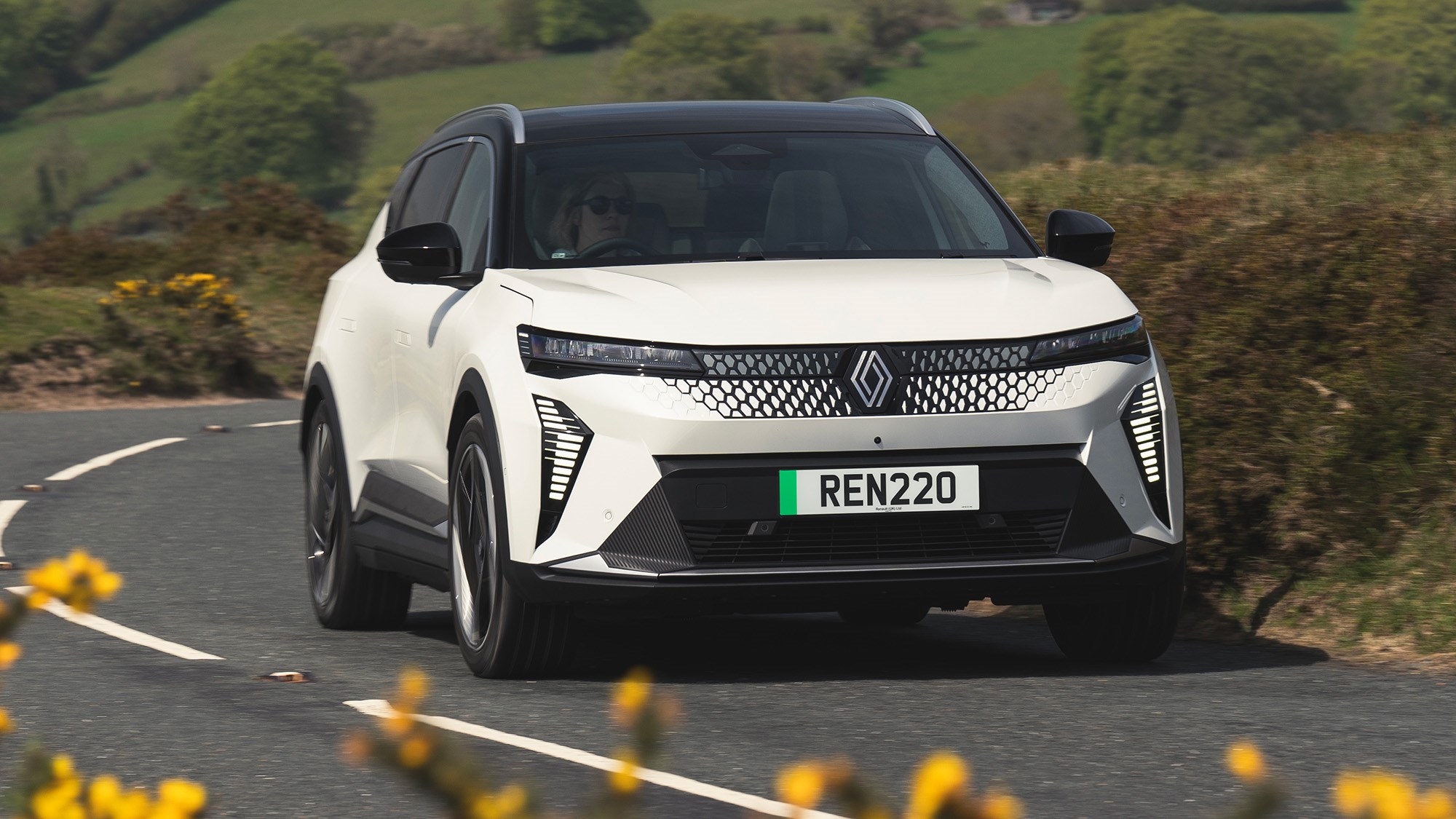
Sure, it’s no Audi Q8 e-tron or BMW iX3, but those are way more expensive models. For the money Renault is asking (between £37,495 and £45,495) it’s made the Scenic feel pretty classy. The door tops are a bit unforgiving and cheap feeling, but with judicious use of the right materials in the right places – Iconic trim has real wood trims, for example – the overall effect gels together nicely. It feels more than the sum of its parts and also solid in the main. Well done, Renault.
Push the start button and this car’s 12” digital driver’s display erupts with hyperactive animations, Google OS branding and a welcome note from ‘70s French electronic composer Jean-Michel Jarre. It’s quite the entrance: the unwary might end up gasping for Oxygene (Google it, Gen Z-ers)
Esprit Alpine trim upgrades the base model’s 19-inch alloys to 20-inch diamond-cut wheels. On Iconic trim rear-view mirror can be turned into a rear-view screen (Land Rover style) to display a camera view of what’s behind. That’s a useful aid when your luggage is packed so tightly from floor to ceiling that you can’t see out the back window, but it has its own issues. In screen mode it doesn’t offer the perspective that a good ol’fashioned mirror does. The old ways, as they say, are often be the best.
And speaking of issues, the rear window is tiny. Really tiny, though not quite the letterbox slit you get in the Megane. And with the Scenic’s large C-pillars it makes seeing out the back a major headache and undoubtedly a key negative of the car. Good job it comes with parking sensors and a rear-view camera (a regular one in the infotainment screen) as standard.
What’s it like around town?
It’s not just those inside the Scenic that get treated to Jean-Michel Jarre’s musical genius. You can select from a few different low-speed alerts to announce to pedestrians that you’re on the move, and one of those is an engaging, multi-layered chord composed by the man himself – thereby saving lives and entertaining the masses in one fell swoop.
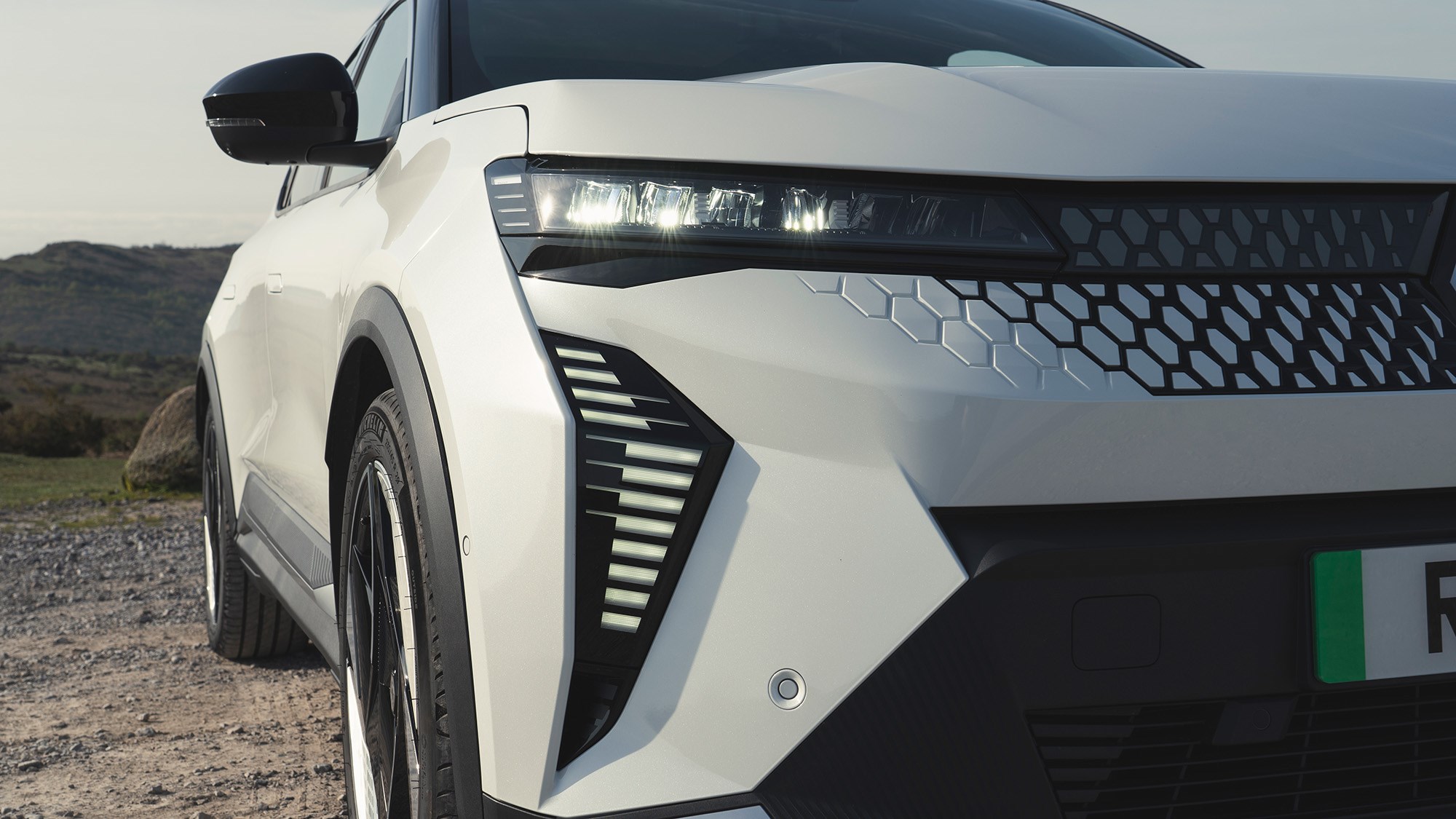
Other now mandatory safety aids, such as the ping for the excess speed warning, have been shrewdly designed by Renault to be as unobtrusive as possible, and there’s a simple button by the steering wheel that disengages other annoying features, like the lane assist, very easily. That’s a really smart and thoughtful move on Renault’s part. It’s also one that rivals like Peugeot, Skoda and Volkswagen would do well to copy to make their models less infuriating to use.
When you’re pootling around town the accelerator is really progressive so it’s easy to drive smoothly. And the brakes aren’t overly corrupted by regen, either, so you can stop the Scenic without face-planting your passenger into the dashboard, but the brake pedal still isn’t quite as predictable as a Tesla Model Y’s. Also, there’s no one-pedal driving like you get in the Y, but the four stages of regen that are available ramp up noticeably and can be changed with a flick of a paddle on the back of the steering wheel.
In Comfort mode the steering is light, and as soon as you get past the first few degrees of steering angle it’s blooming quick, too; as with the Mégane E-Tech, the ratio is a fast 12:1 and there are just 2.34 turns lock-to-lock. That’s great for manoeuvrability in town and the turning circle’s also a handily tight 10.9m.
An e-SUV aimed at keen drivers?
Out in the hinterland the quick-witted steering makes the Scenic feel lithe and agile for all you keen drivers. Some may find the aggressive set-up a bit too much, mind – a bit darty on turn-in – but if it’s your daily driver no doubt you’ll dial into it soon enough. We did. If you need a bit more heft, Sport mode adds it without feeling overdone, and on coarse surfaces you even get a sense of the surface texture coming up the column.
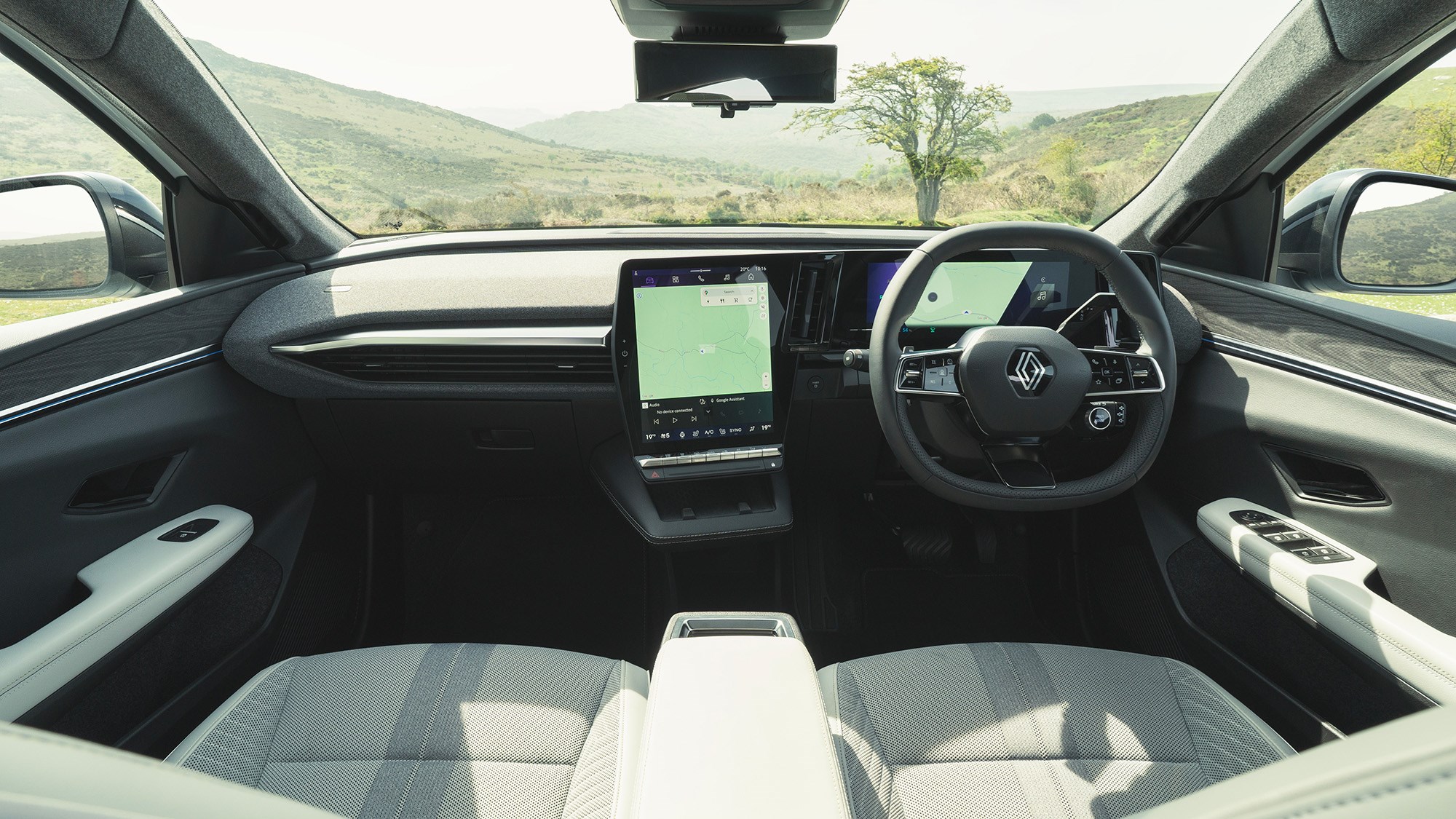
It certainly helps you to set up the Scenic for fast B-road corners, where it’s tied down enough to keep body lean in check for a tallish car. In fact it feels mostly composed and stable when you push on, even with the challenge of a few mid-corner humps thrown in the mix. It also grips well enough on warm, dry roads and, despite being front-wheel drive, delivers just enough traction – you can sense the torque steer if you give it some welly out of tight turns, though.
That said, with a maximum of 215bhp to play with it’s not the quickest EV. 0-62mph takes 7.9secs for the 87kWh and 8.6secs in the lower-powered 60kWh model. But, and it’s a noteworthy but, with its oh-so-smooth power deliver and the 87kWh’s sensible 221lb ft of shove on hand it’s fast enough. Certainly fast enough to carry you along – and past dawdling drivers – happily, albeit without the urgency of the Model Y.
How comfortable is it?
We mentioned warm, dry roads earlier because we were out in Spain for the launch of the Scenic, and it’s fair to say that the quality of Spanish roads makes our’s look like medieval cart tracks. Unsurprisingly, then, the Scenic’s ride was mostly good. That said, it was possible to detect some jiggling and jostling on the rare rutted sections, so there’s a good chance that on a poor section of U.K. Tarmac it’ll feel a bit agitated at times. There’s also a bit of side-to-side sway on motorways, plus some wind noise, too, although tyre noise isn’t a massive issue unless the surface is like rough sandpaper.
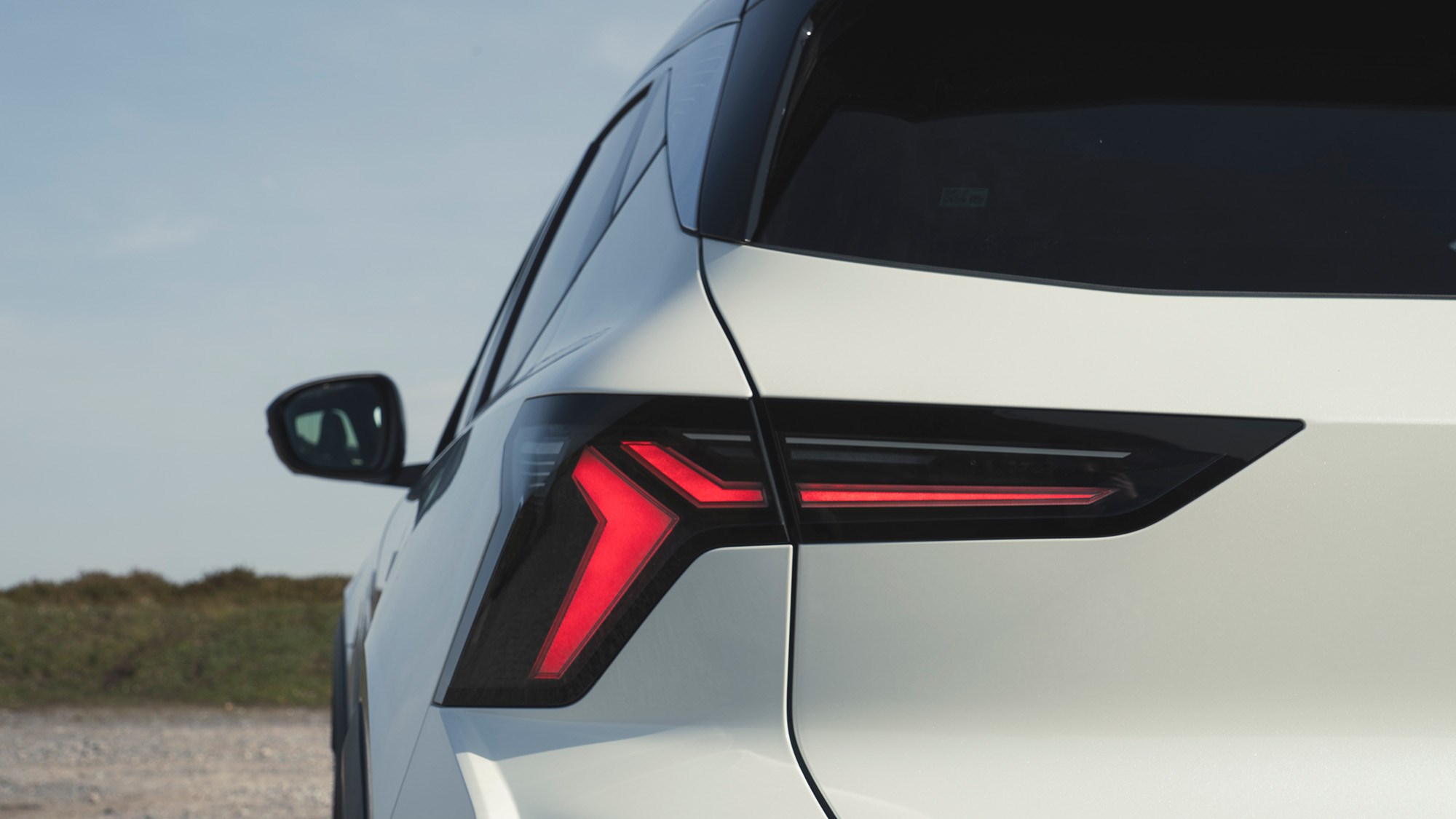
On the plus side, it’s pliant enough to absorb speed bumps in town, and whenever we found any potholes, which admittedly were few and far between and pretty tame by British standards, the Scenic rode them with relative calm. And because the body is well tied down over the ups and downs of a country road it’s unlikely to make anyone travel sick. It’s certainly a better-riding car than the overly firm Peugeot e-3008 although not quite in the Enyaq’s league.
The favourable ride compared with the e-3008 could, in part, be down to weight. The e-3008 is 2,114kg (and a big-battery ID.4 is lardier still), while the Scenic is a comparatively lightweight 1,757kg. That’s a minimum weight for the 60kWh battery, while the 87kWh we tried starts from 1,853kg. For an EV with a battery that size that’s quite an achievement.
Public charging and efficiency
The 60kWh pack returns 3.81 miles per kWh, or 3.7 miles for the flagship powertrain, according to the WLTP cycle.
Crucially a heat pump is standard, scavenging outside air or waste heat from the drivetrain, compressing it to raise the temperature and using it to warm the interior or condition the battery – much less draining than using the air-con.
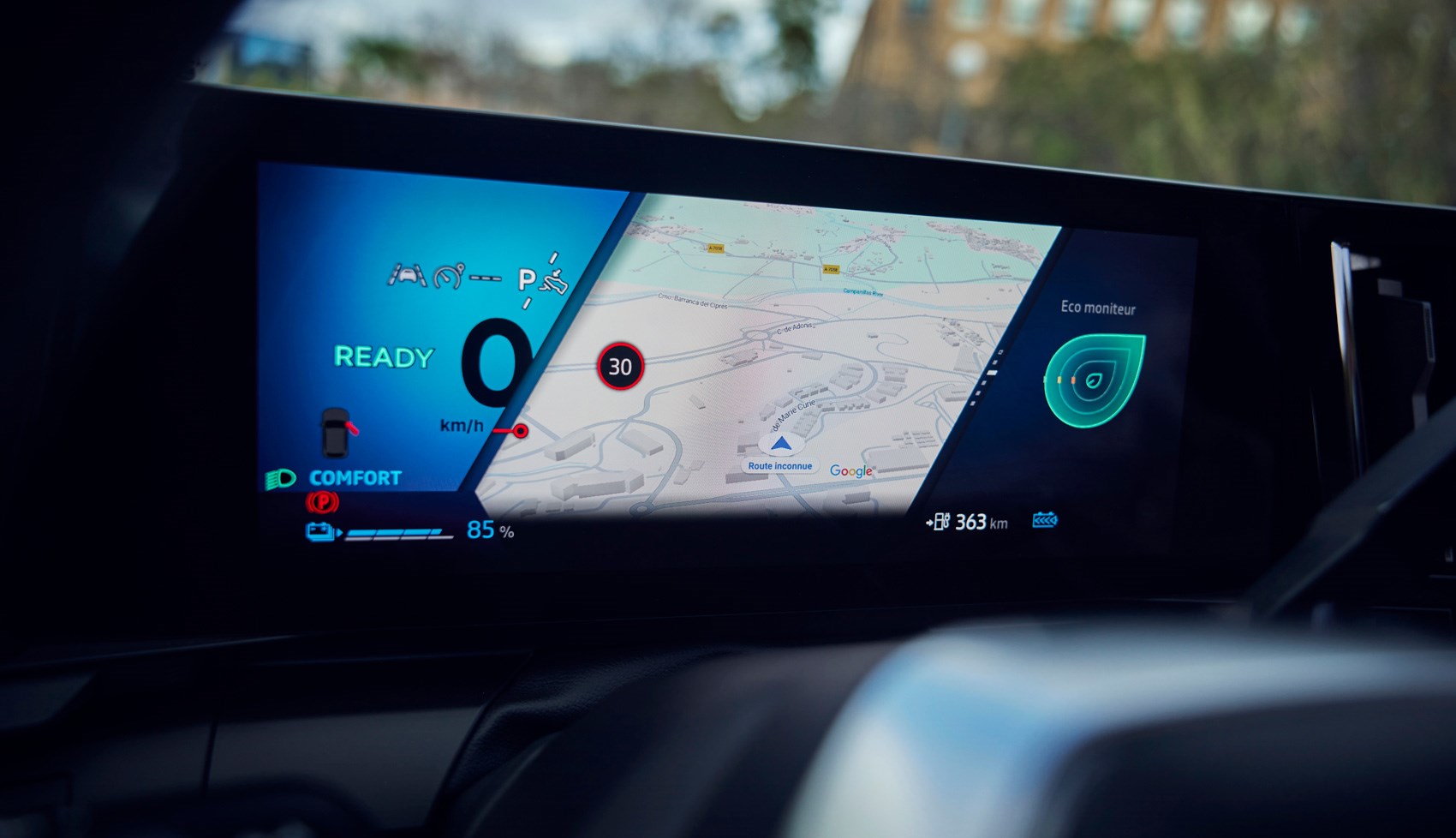
Renault says the Google Maps navigation is linked to the battery management system, so the pack will be heated or cooled en route to a charger to deliver the fastest possible turnaround. The infotainment even considers the weather in a bid to accurately predict your range.
Maximum DC charging is 150kW, and Renault claims a strong charging curve that averages 110kW to replenish 50kWh in 30 minutes – equivalent to 200 miles of motorway driving. The standard onboard AC charger is 7kW, although 22kW is optional for homes with three-phase electricity.
Having a wallbox from Renault subsidiary Mobilize enables bi-directional charging capability and the chance of selling electricity back to the grid at peak times.
If you’ve splashed out on the Iconic trim with the electric driver’s seat, you can pop the Scenic into ‘relax’ mode while it’s charging. That reclines the seat just the way you like it and gives you a massage while you wait. Happy days. Meanwhile, the infotainment mercifully stays on for 45 minutes to keep you and the kids occupied.
What’s the practicality like?
Whether you’re a child or an adult, the rear seats are definitely not the cheap seats. There’s enough head and legroom for six-feet-plus people, the seats are supportive and the squab isn’t set too low (like it is in some EVs). There’s a flat floor all the way across the width of the car, too.
And the kids will love the swish Solarbay roof, which, instead of a physical blind to stop glare, uses polymer dispersed liquid crystals to make selectable sections of the glass opaque. You operate it via a switch in the roof console up front, or using one of Scenic’s 70 natural voice prompts. And because it’s not a traditional blind, it liberates more headroom, so it’s a rare example of style and function together. Another interesting touch is the mood lighting, which can be set to adjust with humans’ circadian rhythms, which we’re sure has many benefits to your wellbeing. Maybe.
The rear armrest is also something that the kids should enjoy. It’s long and wide, with a lid that lifts up to reveal some trays and also a couple of USB-C charging ports at the back. Nothing amazing so far but the trick bit is to do with the cupholders. They swivel to bring into play a tablet/ smartphone holder for each rear passenger.
Sadly, the rear bench itself isn’t quite so clever. It doesn’t slide or recline – apparently, adding that feature would have added weight and raised the seat squab, altering the SUV’s fairly low roof height (1.57m) and squat proportions. The rear seats drop 40/20/40, but go for the optional adjustable boot floor to avoid the big step when they’re down.
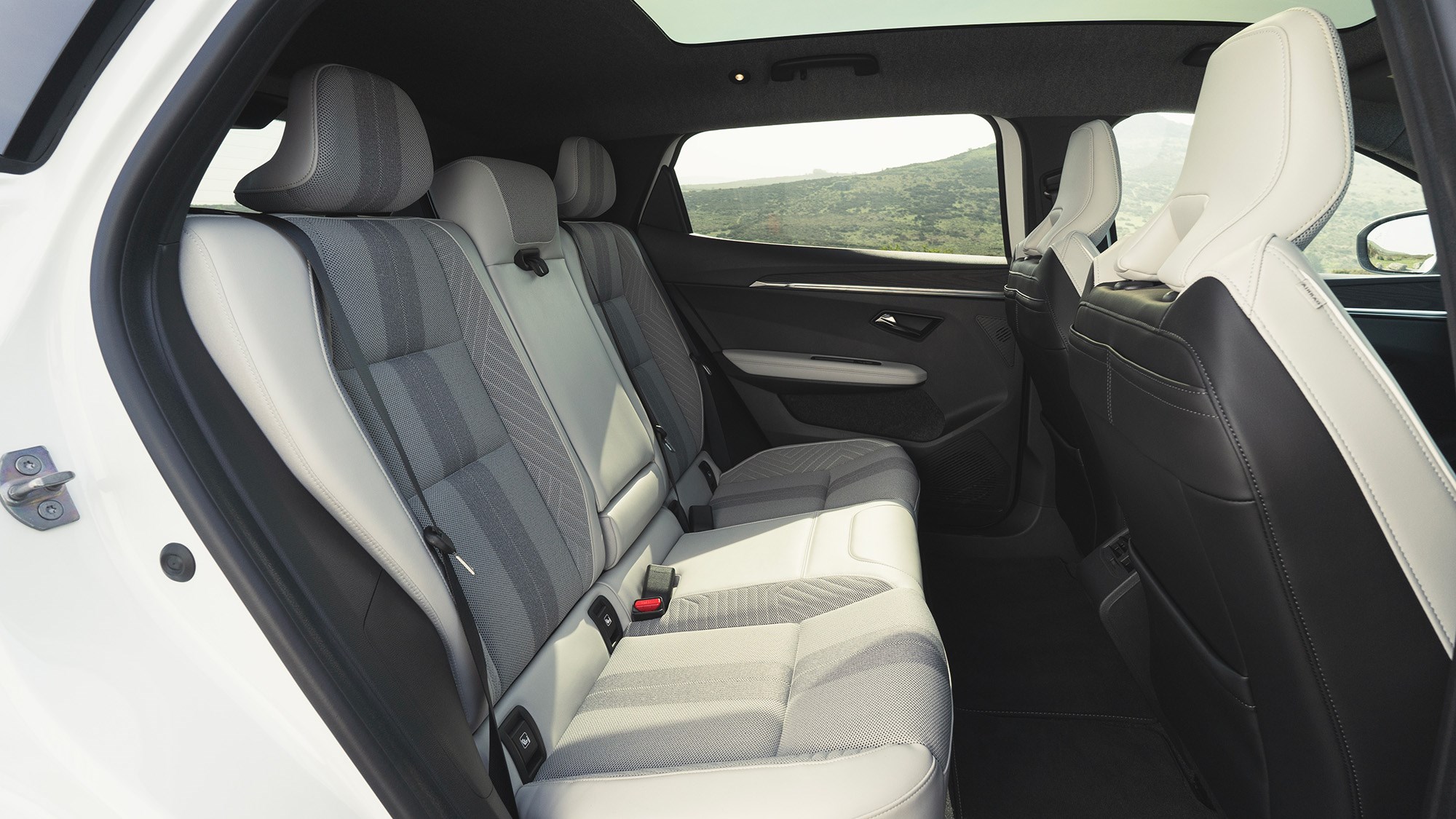
When they are flat you get 1670 litres of luggage space and when there in play you get 545 litres, which isn’t far off an Enyaq’s carrying capacity. You even get 38 litres of underfloor storage, which means there’s somewhere for the charging cables to go, but there’s no ‘frunk’, though.
Dripping with safety kit
The full name of the Scenic’s 1991 concept was Safety Concept Embodied in a New Innovative Car. It only dreamed up a few of the 2024 edition’s 30 driver assistance systems, which include stop and go with lane assist active cruise control, automatic braking in an accident to prevent a secondary collision, plus blindspot monitoring both when you’re on the go or when exiting the vehicle.
And the new Scenic keeps a close eye on the driver too. Not just awareness but also driving style: a safety coach can score your excess speed, any tailgating or enthusiastic cornering. Think of it a bit like a cross between Strictly’s Craig Revel Horwood and a copper in digital form. It’s part of the new driver monitoring coming into force in 2024. As assistance systems go, it’s fair to say the Scenic’s aren’t too intrusive and the constant readout showing the distance (in seconds) between you and the car in front does keep your mind focused on not tailgating.
It even has some novel and potentially very valuable safety kit relating to the battery and high-voltage side. There’s a high-voltage cutout switch in the rear compartment as well as a hole for a fire fighter to connect a hose to. Renault says that floods the battery with enough water to extinguish a fire in 10 minutes. We didn’t test it, but definitely recommend pressing the cutout switch before you do, though.
Renault Scenic: verdict
Some aspects of the Renault Scenic E-Tech electric are certainly curious – like the refusal to confirm whether it’s another MPV or an SUV – and let’s face it, it looks like the latter. If it quacks like a duck, it’s a duck, right? But beyond the marketing strategy it must be said this is one of the better mainstream efforts in the class.
It’s spacious and – true to the original Scenic philosophy – looks after the safety and well-being of those onboard. Plus it’s relatively lightweight for a large-battery EV, and the official efficiency and range figures are bang on the money. The attention to sustainability – in its production and at the end of its life – is noteworthy and commendable, too.
Best of all for car enthusiasts, it has a little old-school Renault va-va-voom. Sure, it’s no sports car, and no, its performance isn’t electrifying for an electric car, but there’s enough spirit in its dynamic DNA to at least provide a semblance of fun for keen drivers – while also proving easy to drive for those that don’t care about such things.
Is it a worthy of a Car of the Year title? We’re becoming more convinced that it is – it’s definitely interesting and well-thought out enough to be in the mix. Indeed, the Renault Scenic E-Tech electric is well worth considering.